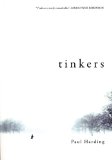Summary | Excerpt | Reviews | Beyond the Book | Readalikes | Genres & Themes | Author Bio

1
GEORGE WASHINGTON CROSBY BEGAN TO
hallucinate eight days before he died. From the
rented hospital bed, placed in the middle of his
own living room, he saw insects running in and out of
imaginary cracks in the ceiling plaster. The panes in the
windows, once snugly pointed and glazed, stood loose
in their sashes. The next stiff breeze would topple them
all and they would flop onto the heads of his family, who
sat on the couch and the love seat and the kitchen chairs
his wife had brought in to accommodate everyone. The
torrent of panes would drive everyone from the room,
his grandchildren in from Kansas and Atlanta and
Seattle, his sister in from Florida, and he would be
marooned on his bed in a moat of shattered glass.
Pollen and sparrows, rain and the intrepid squirrels he
had spent half of his life keeping out of the bird feeders
would breach the house.
He had built the house himself - poured the foundation,
raised the frame, joined the pipes, run the wires,
plastered the walls, and painted the rooms. Lightning
struck once when he was in the open foundation, soldering
the last joint of the hot-water tank. It threw him
to the opposite wall. He got up and finished the joint.
Cracks in his plaster did not stay cracks; clogged pipes
got routed; peeling clapboard got scraped and slathered
with a new coat of paint.
Get some plaster, he said, propped up in the bed,
which looked odd and institutional among the Persian
rugs and Colonial furniture and dozens of antique clocks.
Get some plaster. Jesus, some plaster and some wires and
a couple of hooks. You’d be all set for about five bucks.
Yes, Gramp, they said.
Yes, Dad. A breeze blew through the open window
behind him and cleared exhausted heads. Bocce balls
clicked out on the lawn.
Noon found him momentarily alone, while the family
prepared lunch in the kitchen. The cracks in the ceiling
widened into gaps. The locked wheels of his bed sank
into new fault lines opening in the oak floor beneath the
rug. At any moment, the floor was going to give. His
useless stomach would jump in his chest as if he were on
a ride at the Topsfield Fair and with a spine-snapping
jolt he and the bed would land in the basement, on top
of the crushed ruins of his workshop. George imagined
what he would see, as if the collapse had, in fact, already
happened: the living room ceiling, now two stories
high, a ragged funnel of splintered floorboards, bent
copper pipes, and electrical wires that looked like severed
veins bordering the walls and pointing towards
him in the center of all of that sudden ruin. Voices murmured
out in the kitchen.
George turned his head, hoping someone might be
sitting just out of view, with a paper plate of potato salad
and rolled slices of roast beef on her lap and a plastic
cup of ginger ale in her hand. But the ruin persisted. He
thought he called out, but the women’s voices in the
kitchen and the men’s voices in the yard hummed uninterrupted.
He lay on his heap of wreckage, looking up.
The second floor fell on him, with its unfinished
pine framing and dead-end plumbing (the capped pipes
never joined to the sink and toilet he had once intended
to install) and racks of old coats and boxes of forgotten
board games and puzzles and broken toys and bags
of family pictures - some so old they were exposed on
tin plates - all of it came crashing down into the cellar,
he unable to even raise a hand to protect his face.
But he was nearly a ghost, almost made of nothing,
and so the wood and metal and sheaves of brightly
printed cardboard and paper (MOVE FORWARD SIX SPACES
TO EASY STREET! Great-Grammy Noddin, shawled and
stiff and frowning at the camera, absurd with her hat
that looked like a sailor’s funeral mound, heaped with
flowers and netting), which otherwise would have crushed
his bones, dropped on him and fell away like movie props,
he or they facsimiles of former, actual things.
Excerpted from Tinkers by Paul Harding. Copyright © 2008 by Paul Harding. Excerpted by permission of Bellevue Literary Press. All rights reserved. No part of this excerpt may be reproduced or reprinted without permission in writing from the publisher.
Knowledge is of two kinds. We know a subject ourselves, or we know where we can find information on it.
Click Here to find out who said this, as well as discovering other famous literary quotes!
Your guide toexceptional books
BookBrowse seeks out and recommends the best in contemporary fiction and nonfiction—books that not only engage and entertain but also deepen our understanding of ourselves and the world around us.